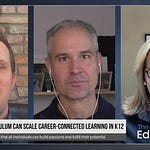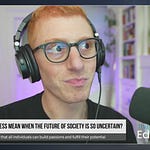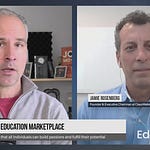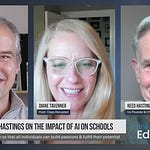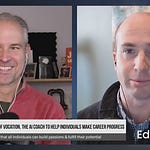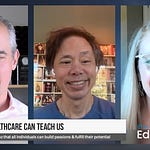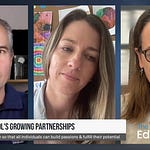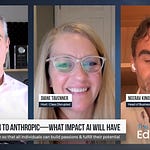Where did you turn for help in deciding what you wanted to do when you grew up?
For more and more students, CareerVillage.org, an online platform that connects high schoolers to advice from real-world professionals, is serving as a trusted guide in navigating their career paths. I sat down with the nonprofit’s founder, Jared Chung, to discuss how they are sourcing and delivering career advice; developing AI that enables the scale needed to address the massive need; and ensuring the reliability, transparency, and accessibility of their services through their growth and innovation. I was particularly struck by some of the intersections with the book I’m working on to help people find their next job, which you’ll be hearing more about in the coming weeks. As always, subscribers can listen or watch the conversation or read the transcript below.
Time Topic
00:54. The story behind Career Village
03:48 Career Village’s scale and services
09:31 How end users engage with the platform
11:25 The AI Career Coach
16:44 User reactions of the new AI
18:59 Ensuring the quality and transparency of the AI, from source data to end product
26:18. Building access through scale and ensuring equity
29:36. The promise of the AI Career Coach and where to learn more
Michael Horn:
Welcome to the Future of Education. I'm Michael Horn, and you are joining us on the show where we are dedicated to building a world in which all individuals can build their passions, fulfill their potential, and live a life of purpose. And part of that, of course, is really navigating the world and transitions from education into career and making sure that you're finding something that really helps you make progress, not just in the jobs that you hold, but in your life. And it's consistent with the purpose that you have. And to help us think about that, today we have Jared Chung. He is the founder and executive director of Careervillage.org, which we're about to hear a lot more about. So, Jared, welcome. It's great to see you.
Jared Chung:
Thank you. It's a pleasure to be here.
Michael Horn:
I'm excited to learn about what you all are doing. I know you have a number of initiatives in AI and elsewhere that are very cutting-edge. But before we get into that, just level set us all what is Careervillage.org, and what's your founding story behind it?
Jared Chung:
Careervillage.org is a nonprofit organization based here in the United States that helps people prepare for careers. And we do that using technology. We do that using people, the power of people. And importantly, we do it at a very large scale. And the reason we focus on scale is that the scale of the need is massive. The number of people who need support, advice, guidance, and information to prepare for their first or next career move is nearly ubiquitous. So, we focus on scale. The origin story, I think that it's almost such a universal mission. Everybody finds in it something that speaks to a part of their lived experience or the communities that they're in. For me, I, as a young person, was very career-oriented because I cared about financial stability for myself, and for my family. When I was in education, I knew that I wanted to get a job after an education that was going to allow me to put food on the table. And that was pretty much my only calculus at that time. I got very lucky to have some people in my life who served as mentors for me to help me navigate my way into college, help me ask questions that I was able to get answered about careers and help me navigate my way in my first job. So, when I started my first job, I turned back and was mentoring and advising young people, volunteering with nonprofit organizations and youth development, and helping young people prepare for careers. So that's kind of what brought me into this work and just frankly, I just love it. Being able to talk to a young person about careers, talk to an adult who's looking to make a career switch, it's so unifying. It's like such a window to connect with people and such a great service, and I think that was what draws me, has always drawn me into this work. But our staff is drawn into this work for a variety of other reasons. Sometimes because they are immigrants to the country and had to navigate the labor market, sometimes because they had experiences in their lives where they felt that they needed to get into an occupation where they weren't well represented and didn't know how exactly to get started. I think that each of us brings something unique to the mission, but it's really unifying.
Career Village’s scale and services
Michael Horn:
No, that's super helpful. Now, you mentioned scale, so give us a sense, I guess a little bit of a lightning round here, right? Give us a sense of what kind of scale are we talking about. I know from your website this isn't just like sort of one-off mentoring conversation.
Jared Chung:
No, not at all. The first thing I should say is that Career Village, as you mentioned, offers multiple services. And if you take those services, and we've been doing it now for 12 years, if you look over the long arc of our existence and the services that we offer and add them all up, what you'd find is that we have reached millions of people with career information advice. The latest count is, I think over 7 million people engaged in this in one way or another, either as a learner or as someone who is giving career information or advice to a learner, mostly in the United States. But we have had beneficiaries in virtually every country on earth. I think the last count was 190 different countries where we've had people coming to access the career information that we are putting out. So, when we talk about scale, we are talking about millions of people and we know that even that, although we're very proud, hundreds of millions of people need this service at any given moment. We still very much ask ourselves the question, how can we continue to expand the scale of our services to match the scale of the need?
How end users engage with the platform
Michael Horn:
Yeah for the book that I'm working on right now, our estimate is that in any given year a billion people worldwide are switching jobs. So, no question about it. I'm curious, how are students engaging in it from the top? What's the biggest pain points that they come to you all with and how are you reaching the students? Is this a direct-to-consumer or is this something you're working with colleges, universities, and high schools around?
Jared Chung:
Yeah. Well, I think traditionally Career Village has been most known… I think we're most known for one product and one service in particular, which is an online career Q&A platform. This is our standout performer, and on that platform, learners come in and can ask any question about any career. And we have now over 150,000 people who are working professionals from all walks of life who answer those questions on the web platform. So, a classic Internet Q&A forum, but really tailored for this particular purpose. And the platform is really, really good at doing this. The community is really good at doing this. They answer questions quickly. You get multiple answers per question. The quality of the answers is really high. And the community is also incredibly accommodating of wherever the learner may be in their journey. So, they may be asking a very sort of what you might think of as an entry-level question, a basic exploration question. They also might be asking a very advanced question comparing particular credentials that they might want to get, or how they might go about improving a cover letter or other topics. I think that the thing I do want to highlight is that the breadth of questions people have is so massive that it can become hard sometimes to say, well, what's the main use case? Because there really isn't one. We get such a huge breadth of occupational interest. There are some spikes, like TV careers, programmers, doctors, nurses, and lawyers. You get some spikes in those areas, but there's such a long tail of occupational interest. And I think that's one of the things we've learned that I want to communicate broadly to the sector, is that if you only provide support for particular occupational verticals, you're going to miss a lot of students who are in the very long tail of occupational interest that you don't support. So being able to say any question about any career is an important promise to be able to make to a learner.
Michael Horn:
Yeah. The service you're providing, frankly…We have this nine-step process we've been writing through, and part of it is helping people flesh out, as you were basically alluding to, divergent prototypes for what they could do with that next job. And one of the biggest things is understanding what do people actually do in those jobs and how does it line up with the things that bring me energy and the skills that I have. This is a great platform, it strikes me, for that engagement.
Jared Chung:
Among the most common archetypes of questions is walk me through a day in the life of insert occupation. How will my life be different how will my experience be different if I'm an ER nurse or a pediatric nurse? What might my day be like if I'm an auto mechanic versus if I'm doing some other occupation? So, it's super, super common. To some extent, learners would like to hear that from first-person narrative. And that's one of the reasons why I think that this online platform with a large community behind it has had such success.
Michael Horn:
No, that makes a lot of sense. So, last question before we switch to the AI piece of this. That is, I imagine, turbocharging all of this. I'm just curious, how are you reaching the students? Is this direct? They find you. This has become a big community, obviously, or do you work with schools to access the students and help give them the support that they need?
Jared Chung:
Yeah, we've worked with schools, educational, and nonprofit organizations since day one. We started off in classrooms providing this program and service. However, after a couple of years of building up the Q&A content, the direct-to-learner online audience started to really balloon and at some point, eclipsed the population that was coming in through a classroom. And that's continued to this day, where the vast majority of the people that we reach with the online Q&A platform are actually finding us on their own, either on Google or LinkedIn or social media. Sometimes when they are actively searching for the answer to a career question could be Thursday night, they're on their cell phone at home. It's not a happy moment, it's an anxious moment, wondering something about the job that they're looking to get into and searching the Internet. It's hit or miss of whether you'll find something good. And often they will find Career Village. That is the step that brings them into the community. If we earn their trust and create a welcoming space. The direct-to-learner channel has really become by far the largest channel for that particular service.
The AI Career Coach
Michael Horn:
Very cool. So now you've launched this AI career coach. Tell us what that is all about. How does it complement what you're doing and what does it allow you to do that maybe you weren't before?
Jared Chung:
Yeah, listeners probably have at this point heard AI attached to everything in the world. I think what I'd say is this use case is so perfect for large language models in the current era of AI. And I really believe that personalization is one of AI, and education, I think is one of the real shining spots of AI. I'm not an AI promoter like the whole world should have AI everything. I'm not like that. But I do think in education, personalization is so valuable and AI really allows us to scale that. We are seeing huge impacts of using AI in the field of career development. I’ll give a little bit of history. We started the AI career coach project really, like pretty much right at the beginning of 2023. So, we moved pretty quickly on it. And I think the reason for that is that we have been already using machine learning in our community for quite a while for sometimes simple things like automatically categorizing content or flagging things. But pretty quickly we realized that as a text-based online platform, a lot of the operational stuff that we were helping our advisors with could be supported with large language models to give them extra tips to make their content more comprehensive or to offer them some grammar checks or spelling check, things like that. We started to play around with that and then pretty quickly realized that we could do so much more. We went out to put large language models right in front of some of our users and just immediately saw that some of the things that learners want to get practice with, like a mock interview or writing a cover letter or things like that, could be instantly available with large language models. So, we started the AI career coach project. And really what it's trying to do is to be the world's greatest career coach. Instantly accessible but working in collaboration with the educators who are already supporting the learner. And I think that part is really important. It's a chat-based, real-time chat application. You go in as a learner and you pick off of a menu of activities that have been predefined and pre-optimized to be helpful to you in your career journey, and you engage in those chats. And the coach is bringing in third-party resources. It's doing monitoring and quality control, but then also it's integrated into the work that your guidance counselor or your teacher or your program leader is already doing with you. They can see what kind of activities you're doing. They can get tips from the coach on areas where they can support you in your next step. They can assign activities to you, and it serves as almost an assistant to them to give them more time to spend their energy doing the stuff they really want to do, which is one-to-one work with the learners.
Michael Horn:
Very cool. So, if I'm understanding you correctly, I as a student might find this resource, but then the real magic is I connect it to the team around me who's supporting me, guiding me in my college, career, whatever choices. And they're also getting feedback or reports about me. In some ways, you become almost a network hub with this AI in the middle, just giving insights or prodding or feedback, whatever's required to the different parties that are supporting that student.
Jared Chung:
I'd say yes, however, very intentionally, not in the middle, very intentionally. It's a three-party collaboration.
Michael Horn:
Got it.
Jared Chung:
Even to the extent where we're looking at potentially actually having the chat not be between just the learner and the coach but giving the ability for the educator to be in the chat as well. I think what we've learned from the testing of the career coach so far has been that learners don't want to just get help from a person or just get help from an AI. They want to have that real integrated hybrid. They want both because there are times when you want to go to a trusted person to talk about certain things and times when you want to get that instant dialogue and sort of safe space exploration that you can get from chatting with an AI. We're really leaning into not in between, not in the middle, but it's a space where there's this three-party collaboration happening.
Michael Horn:
Very cool. So, have you found people excited about this? Are they skeptical? You mentioned AI cheerleading.
Jared Chung:
Right off the bat.
Michael Horn:
They’re excited right off the bat?
Jared Chung:
Right off the, well, I'll say the learners right off the bat. The benefits of personalization, literally day one of testing. And just to give some context, I mentioned that we started the project very early in 2023. We went into beta testing with real students in real classrooms back in, I want to say, July of 2023. Everything moves so fast these days, that it's kind of hard to remember, but I'll just tell those who are listening, that was pretty early. There was very little AI large language model chat going on in classroom settings. Right on the very first day, I was in a school library for a summer school program watching 70 high school students using the coach. That morning, their counselor had given them all a mock interview worksheet, and they had all answered the same five or six questions. They go on to the AI career coach platform that we built, and each of them gets their own customized mock interview that's customized to their particular career interest. You could just see how much they appreciated that personalization right off the bat. And since then, we've had tons of iteration. You have to make sure that if you're making a chat-based application it's really easy to read. You can have too much text or too little. There was a point when it was too fast. It was generating text too quickly. The learners were getting intimidated. We wrote in lines of code just to slow it down a little bit. So, there's a lot of this kind of fine-tuning that we've been doing over the course of many months in partnership with schools and nonprofit organizations. Over 20 schools and nonprofit organizations have been part of the testing to get ready for where we are now, which is coming up on the public release, where anybody in the world can just sign up for it and any educational institution can roll it out with their learners.
Michael Horn:
So that's exciting. You've been in beta for a while, coming out full release soon. Is this built on top of OpenAI's Chat GPT, or is this something that's proprietary to you all? Where have you built this on top?
Jared Chung:
The way you have to make these applications these days is deeply layered, and you have to use multiple large language models. So, this is not just a wrapper on OpenAI's Chat GPT. This is a system that is multi multi-large language model. It's an AI agent that's going through lots of steps. It uses third-party data at various points. I don't know for the technical folks who are listening, that uses retrieval augmented generation to give the AI agent access to verifiable information to improve accuracy. It has to use lots of models because you have to make sure that you're using the right model for the right step, and you can't rely upon any single model for that.
Ensuring the quality and transparency
Michael Horn:
I think the other… You said that learners are excited about this. They don't have questions about its form factor. But quality advice, as you know, is something not to be taken lightly. I mean, something that I've talked a lot about is it's fine for Netflix or Amazon to use an AI model that's based on percentages, because if they recommend a squash racket and you don't play squash, very little harm done. In the world of education and careers, the harm can be much more significant. So how do you think about making sure this isn't misleading people or undermining their confidence or something like that?
Jared Chung:
We've been thinking about the quality of advice and appropriateness of content ever since the very beginning of Career Village because we have been running this large-scale online crowdsourcing platform. We've built extensive systems for monitoring and moderating career advice written by people for a very long time. It's one of the reasons why I think I'm particularly excited that we are working on the AI career coach is that we have such a history of being thoughtful about these things. I think in an AI context you have particular challenges. Number one, the volume of content is massive. So, we've had to really take all of our monitoring and moderation systems and scale them up to deal with just orders of magnitude more content. The second thing that's really important is, in addition to the factor you mentioned, which is quality, and accuracy, those factors, in addition to that, in an AI context, it's also super important to be thinking about things like bias, and explicit or implicit things like inclusiveness. You need to think about whether the AI application is doing hallucination of any kind and transparency around that. In fact, there's a huge list of things that have to be checked. So a lot of our attention has been on the monitoring and moderation system, and we built this system that is a two-tiered system where the first tier has a series, a very comprehensive set of automated checks that have to happen before the content is essentially greenlit to go to the learner. And it's checking for, again, a wide variety of things. Then you have to have a second tier, which is human oversight, sometimes trained career village staff members, sometimes experts who are qualified to look at that first tier and say, is it doing a good job? And what do we need to do to make sure that it does an even better job to be able to handle the volume of content? And then you also have to set norms with your learners. You have to be transparent. You are not chatting with a human being here. You're talking to a computer program. We're very consistent about that, especially with the younger learners. We have to be clear, this is a computer program, and there are limitations to what it can do, but also to the educators in the mix as well, to make sure that they understand what these systems are capable of right now. One of the things we learned at the very beginning is a lot of young people are going to end up chatting with the AI career coach as their first time chatting with an AI. And that means in some cases, we need to offer a supplemental AI literacy curriculum that people can do as a prerequisite to even being able to go into the platform. We picked that up very early in testing, so a lot of work has had to go into that. And it's one of the reasons why. I think one of our key insights here is that even though making a system like this can seem intimidating, we'd say actually at this point, making a chatbot is actually pretty easy. But making a system that's really using responsible AI principles in practice, that is actually the really hard part.
Michael Horn:
Well, that makes a ton of sense. I want to stay on something because you talked about all the different models you're using and blending to create this. And I assume that the fact that you have massive amounts of real conversations on the platform creates a great data pool or data lake into which to train the AI and use some of the checks. I imagine that you've come up with real people before as well.
Jared Chung:
Yeah, absolutely. And I think the key there is to know in that chain of thought that has to happen. When a learner initiates an activity, they initiate a mock interview or they initiate network 101 chat, for example. At each step, the AI application is going through a series of chain of thought processes that involve multiple large language models. Some of those have to be deeply steeped in career advice. Some of those are doing a very simple thing and don't need that kind of specificity. So, I think you have to be, from an engineering standpoint, you have to be attentive to which steps of that chain of thought require which learnings and context. And it's one of the reasons why we're really happy to have these twelve years so far and counting of really high-quality career advice content to help inform the AI career coach. And I think these things will work together. Ideally, you want to see that a learner at times, they want to go to an AI application and get a real-time chat, and at other times they want to go to the community, and they want to ask that question, what was your job like yesterday? And they seek that first-person narrative. And I think we need to be offering both of those to learners.
Michael Horn:
Got you. Now, I'm sure people listening are saying, wow, they're a nonprofit. How does the business model work for this so that you can support all these connections, both the personal and the mentors as well as a tool like AI career coach?
Jared Chung:
Yeah, this is not easy work to do. I'll just say tremendous credit to the Career Village staff, which is an extraordinary staff, a small staff, very, very talented people who are building, like, let's be clear, this small nonprofit organization building a cutting-edge AI application that's being deployed in the wild. This is really important and hard work to do. And there are two commitments that we've made. One commitment we've made is that for individuals who just want to sign up for themselves, we believe this should be free. And as a nonprofit organization, we have had great success going to philanthropy to make sure that they understand the value of this kind of service for individuals. And we're committed to continuing to go to philanthropy to get the funding needed to continue to support the individuals so it can be free for them, for institutions, we've made the second commitment. While we do ask institutions to get licenses to use it at large scale, if an institution is unable to pay a license, then we also are earmarking a significant budget to subsidize, or even sometimes in certain cases, make it free for those institutions. I'm going to try to stretch that as far as we can to make sure that this is as equitable access as possible. And just to give context, we're talking about single-digit dollars per learner per year. It's very low cost. But even at that level, if you look at an international audience, there are going to be places where even a single digit US dollars per learner per year is prohibitive. And we think that access to a tool this fundamental needs to be as broad as possible.
Michael Horn:
Gotcha. Now the AI career coach, as students are engaging with it, I'm sure a lot of folks have been reading AI can be expensive, too. This isn't just like a marginal cost of zero, right?
Jared Chung:
It's not a marginal cost of zero very much. We feel that for sure. You have to be very cognizant of the cost of AI applications. They're very different from traditional web applications in terms of cost structure.
Michael Horn:
Yeah, but compared to, I guess, the alternative, which is every single individual finding someone to give them a mock interview or something like that, or to give them coaching on their resume or whatever it might be, it sounds like that's the comparison set that has led you to say, if we care about scale and equity, this is worth that trade-off, if I'm understanding.
Jared Chung:
That's exactly right, the return… If you're going to take a very sort of purely financial look at this thing, what's the return on investment of having an AI-based supplemental career coach tool? And the ROI is super massive, especially if the return we're talking about, by the way, is learner outcomes.
Michael Horn:
That strikes me as the most interesting part of this. I know from talking to a lot of individuals who work in the college career coaching and counseling space, for example, those offices tend, as you know, to be extremely understaffed. They are often on the back end of a student's journey, not on the front end when they're thinking about courses and internships and networking. I'm curious. It strikes me that the more you develop the AI, the more it can be part of a companion almost to a student, not just when they're having the conversation with a counselor, but much, much earlier as they think about courses. What might I do this summer? On and on and on. How big does this vision get from your perspective?
Jared Chung:
How can we support those teams with the cavalry charge to help them deal to… Do a great job with the huge caseloads that they're often asked to support, and the huge number of people they're often asked to support? And I think that's kind of the approach we're taking, is let's bolster that team and have the coach serve in that role. It should be great when it's one-on-one with an individual who just wants the help themselves. And it should be fantastic when you're using it as an individual in an educational setting where it's supplementing the work of a counselor or instructor.
Michael Horn:
That's a great, inspiring place to leave it. Jared, thanks so much. We will look eagerly as a career coach gets launched into the wild and for the masses. Please check it out.
Jared Chung:
Yeah, careervillage.org. And if you want to go, check out the AI career coach itself: Aicareercoach.org.
Michael Horn:
Aicareercoach.org everyone check it out. Jared, thanks so much for joining us on the Future of Education.
Jared Chung:
Thank you for the opportunity and the work you do.




